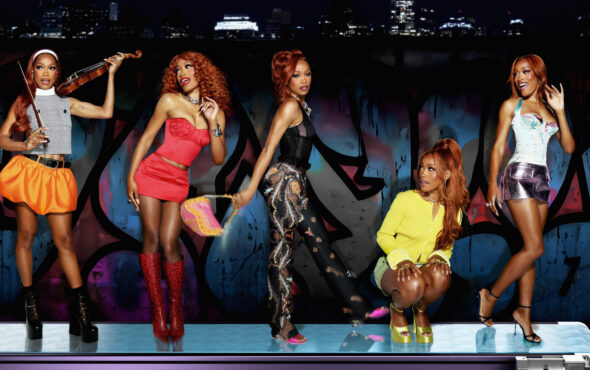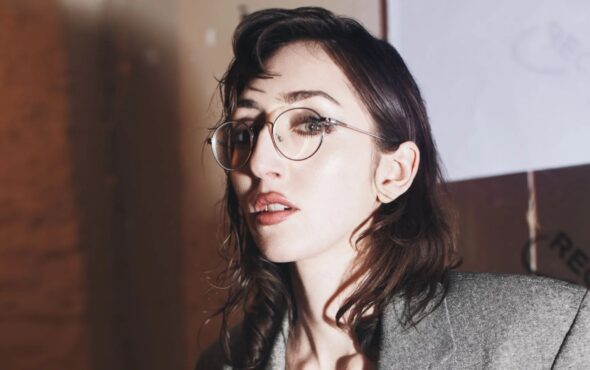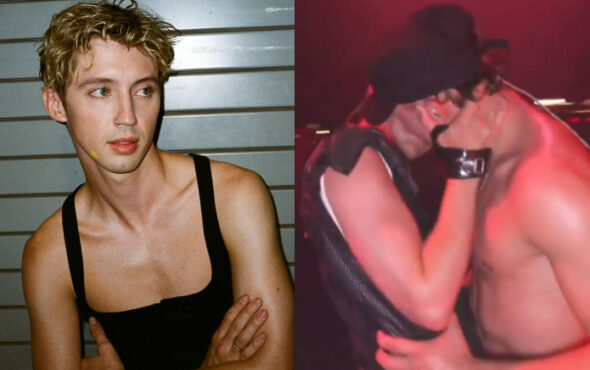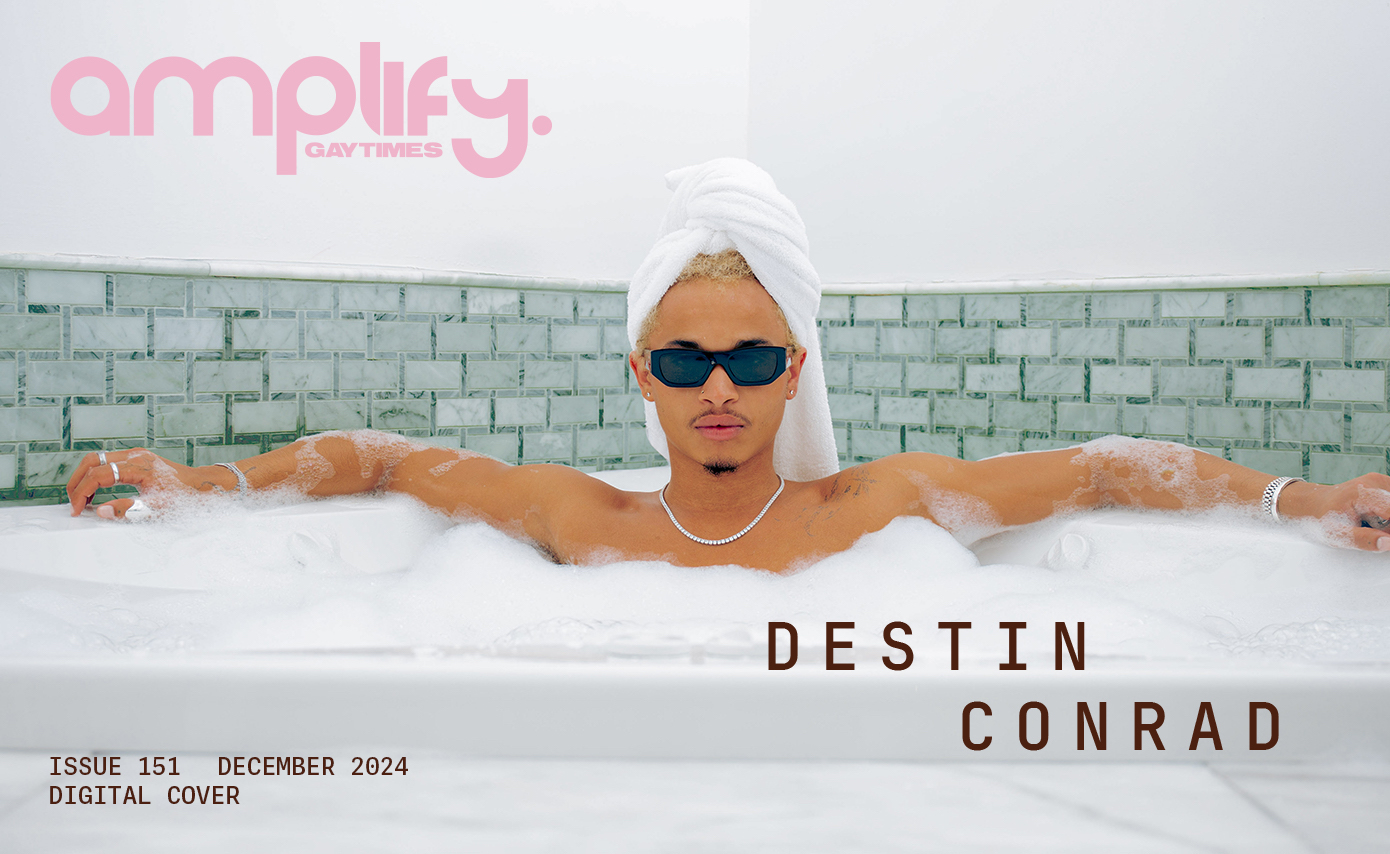
Earlier this year, Destin Conrad was in an Uber riding through New York City. He was lost in his own world, in his own problems, staring out the window. And then he saw her: a girl standing at the bus stop with the word “Submissive” stamped across the front of her hoodie in big bold letters.
“It brought me so much joy,” Conrad tells GAY TIMES. The hoodie was merch from his two-part Submissive project and accompanying from earlier this year. Though the driver was going too fast for him to roll down the window and call out to her, the experience stuck with Conrad. “I almost started crying in the Uber. [That hoodie] is something so loud. I’m sure that girl has gotten questioned about why she has it on. It’s just crazy how it can be a part of somebody’s everyday life. It was one of those moments that kind of hit me.”
But that’s the work that Conrad is making: stuff that people feel deeply. Over the span of five EPs, the Tampa, Florida-born, Los Angeles-raised, Brooklyn-residing R&B singer has solidified himself as a talent to be taken note of. He has a voice that, like some of America’s great singers, got its start in the church, and a face so compelling that he recently served as a video vixen of sorts in one of Lil Nas X’s latest visuals. (You also might recognise that face from the remnants of his Vine stardom that live on as GIFs to this day.)
The singer-songwriter, who takes both halves of that label as serious as the other, is a true crooner. You can hear it on his hit “In the Air” where he tries to carefully tread the line of telling a situationship what you want without being demanding. And if pining and yearning are physical manifestations of crooning, you can see it in his eyes through music videos for tracks like “Nosebleed” and “It’s Only You.”
Here, we talk to Destin about the role music plays in his personal life, why his biggest song doesn’t have a music video and what he thinks about men who can hear his song “WAR!” which claims he would go to war for the dick, and not be convinced he’s gay.
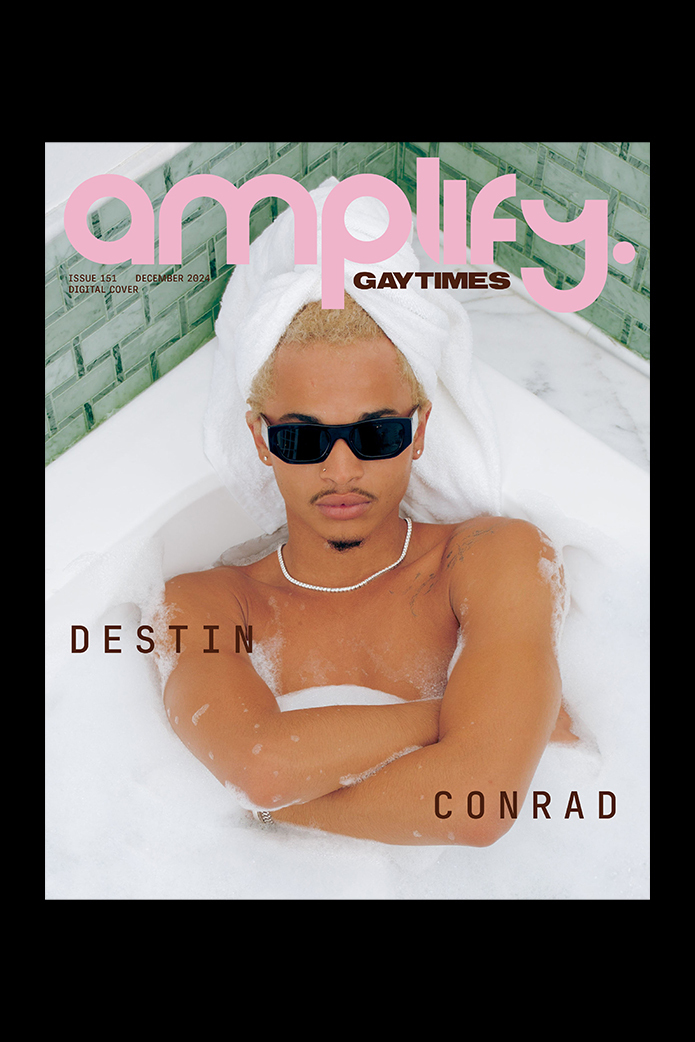
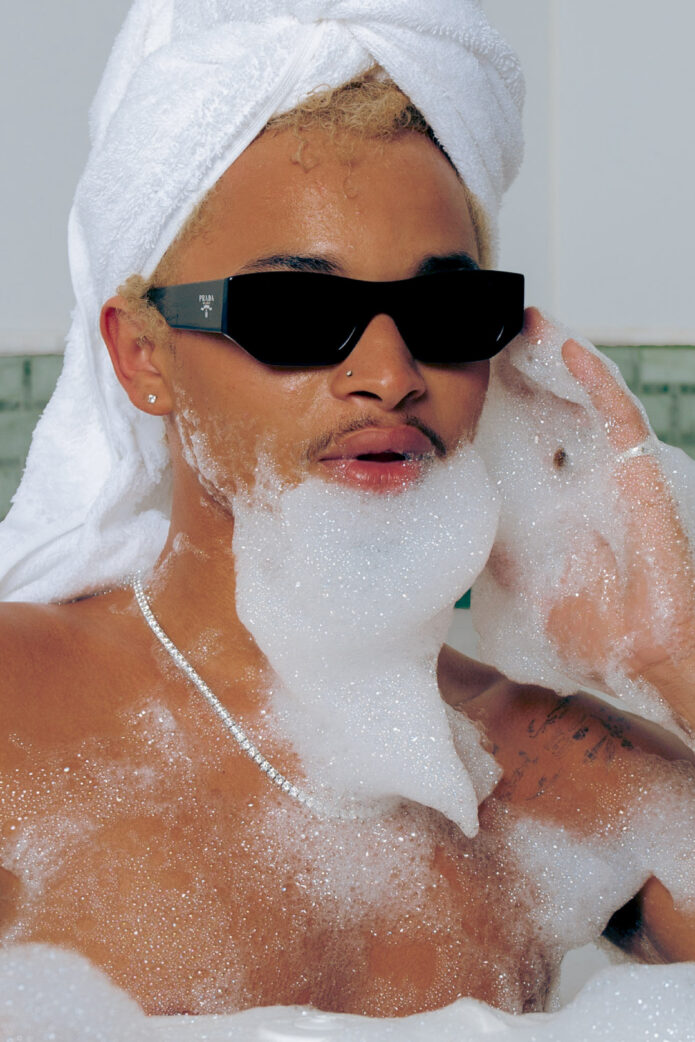
What’s the role that music plays in your life? For some people it’s therapy, for some people it’s a way of explaining their mood, what is it for you?
It’s definitely therapy for me in a sense. When I go through something with someone I’m definitely like I need to write about this. It all comes back to my actual life: my romantic relationships and even my platonic tiffs that I get in. I just want to write about them and how I felt. It’s about how I feel and it’s a form of therapy.
Do you write about things while they are happening or after?
I can’t write about it when I’m going through it. I have to feel it and then get over it and write about it. It would be really sour if I wrote about it while I was feeling it. When you feel things very strongly and it’s current, it’s hard to take yourself out of it. I definitely have to say ok that happened, let’s evaluate: how did that make me feel. That’s where the therapy comes in.
It’s sort of like a debrief with yourself afterwards.
Exactly.
So you’ve been singing like all your life, right?
Yeah. I grew up singing in church. My aunt was an evangelist so she was a big reason as to why I was in music and performance at an early age. She would have these church boat rides where she would rent a boat and everybody would come on and everyone would donate and fundraise and I would come on and sing. My mom also told me that I would hum a lot when I was a baby before I could talk. So it’s kind of always been a thing for me.
It’s interesting because I’m too online – I’m on Twitter too much – but one of the things that’s said on there every few months is we don’t have the great singers we used to have because people aren’t growing up in church any more.
I keep seeing that too. I mean the root of R&B is gospel. I feel like before we were making love songs about people it was definitely about God and then someone made it secular. I definitely agree in some way that it does play a role in R&B and why [the genre] isn’t as big as it used to be. Not a lot of my peers go to church. Even melodically there’s a lot of things that tie gospel and R&B together with runs and the inflection. I learned a lot of that in church and listening to gospel music. A lot of R&B artists I know are big fans of Kim Burrell and freak out over those church runs.
“Submitting is the ultimate power and strength.”
You said that Colorway changed your life forever. Was it just that it helped you decide to do music full time or was it something else?
That’s definitely what it was, the fact that it gave me purpose. I didn’t really know what I was doing. My friends were like well you can do this and you can do that, maybe you should act. I just feel like I didn’t want to choose one thing so I did a lot of different things. I sold t-shirts for a while, I did everything. But I’m in it now. I identify myself as an artist now. I’ve toured and done the whole thing. And maybe it was a little bit of imposter syndrome that played into it but now I walk in the room and I’m like I’m an R&B singer.
Sometimes that feels like something you can be even more proud of if you discovered it on your own and it’s not something someone told you to do.
For sure. I’m definitely proud of it because it’s mine. It’s my story, these are my experiences, my melodies, my writing. Granted, I work with songwriters as well and I love collaborating with people but the majority of it is my story and my feelings. I’m very proud of it now.
When you went in to start working on your Submissive project, did you know you wanted it to be a two-part project?
It’s something that had crossed my mind. But I didn’t really know I was going to make a part two until I started making it. A big reason I did part two was I wanted to tour and I didn’t have enough songs because my projects were EPs, they weren’t full-length albums. So that was a big reason: I wanted to have a full set list.
But I came up with the idea of Submissive being the title because I knew that it would draw people in because it has a sexual connotation and people are just horny. But my angle was submitting in a way of surrendering to the unknown and the strength that carries. To just submit in the way that “whatever is mine is mine.” Sometimes I feel like that is way more powerful than dominance. I feel like sometimes dominance can be fickle and fragile and too particular. I feel like submitting is the ultimate power and strength. That’s where I was coming from with it for the title.
In the leather and BDSM culture it’s often said that the dominant is only as dominant as the submissive allows. And in that way the submissive is the one really in control because they sort of lay out their boundaries and the dominant gets to be dominant within those parameters.
That is so powerful to me.
How was headlining your first tour earlier this year? I know obviously you’re onstage longer but vibe-wise how was that?
It was probably one of the most gratifying things I’ve ever done. Also one of the most tiring things I’ve ever done. Very different from opening up for another artist. I feel like there’s a pressure when you’re opening up for somebody else. I’ve just heard horror stories about people opening up and fans being horrible to them, though I never had that experience. I opened for Syd and that was my first time playing my music anywhere and I had just put out Colorway. That was my first tour and her fans were very receptive. Then my second tour was opening for my sister Kehlani which was very easy. They were very receptive to me because they knew me already.
But opening wasn’t as gratifying as knowing that I was doing my own show and that people bought tickets to come see me. It goes back to the real-life-always-outweighs-the-internet shit. Because the numbers can be so high and you don’t make people feel anything. It doesn’t add up. But when you see it in person… that’s what makes it worth it. When I’m super tired and don’t want to work, seeing people who tell me how my music makes them feel or seeing them wearing my merch makes me feel like, okay, this is real I can’t stop. I got to keep doing it. I can’t disappoint people.
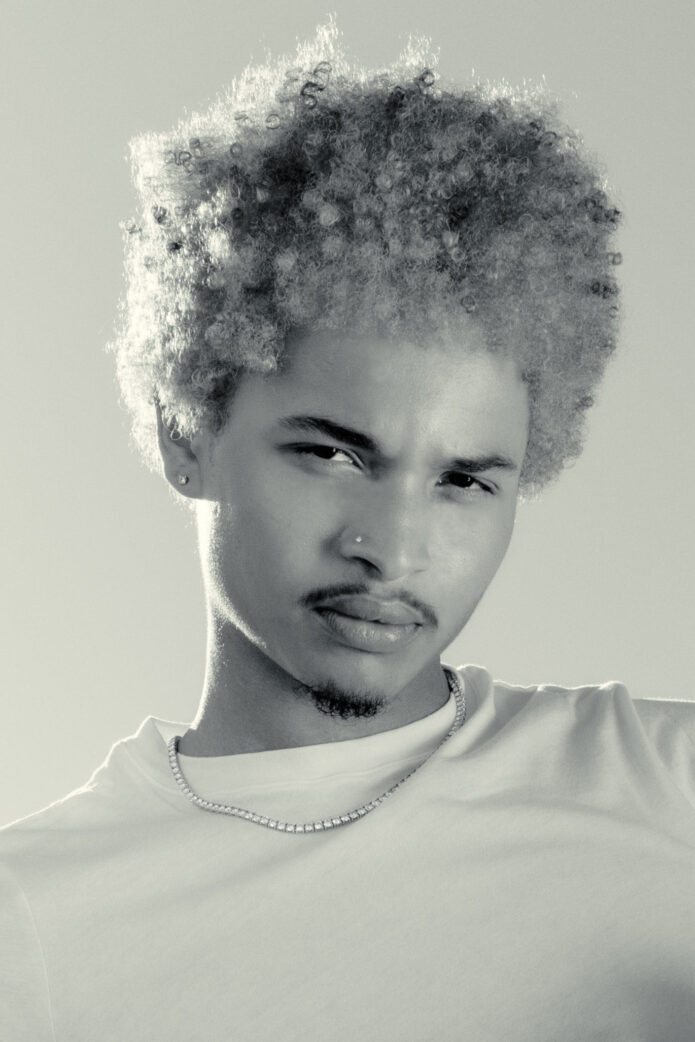
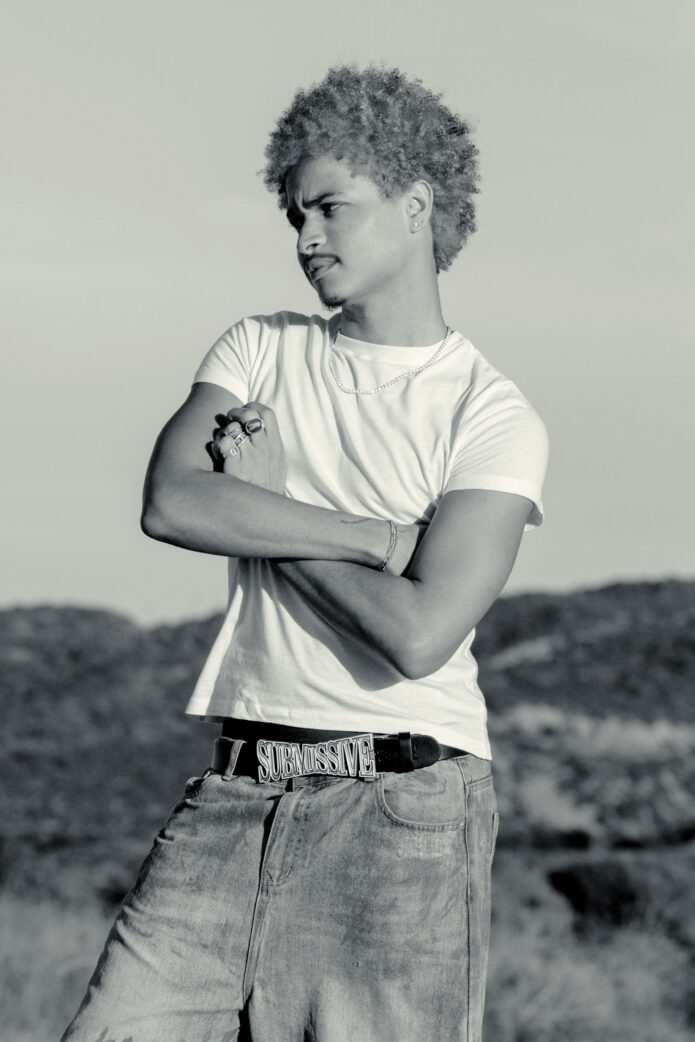
How intentional are you with your visuals and music videos? I ask that because I’m thinking about the decision to have men be your romantic interests in the videos. Is that something you’re super conscious about?
I wasn’t in the beginning. As I said, before I was an artist I kind of ran away from the idea of being an artist in a way. I was kind of still in a limbo of if I wanted to do that. So that anxiety showed up when I started putting out videos because I just didn’t know what I wanted to do. I didn’t know if I wanted to be perceived. I’ve shot a couple of videos that will never see the light of day. One of my biggest songs actually, “In the Air,” I shot a video to that song and never put it out. I probably should have because that was my first project. And even for me as a fan of other artists, it’s always cool to see their growth in the form of visuals. But I was just so particular and scared about how I would be perceived. So now I’m trying to convey a message in my videos.
With the “In the Air” video was it that you didn’t want to be perceived or that you weren’t sure that was the way you wanted to be perceived?
I wasn’t sure that was the way I wanted to be perceived. I wasn’t in love with how it made me look. The story probably could have been told better, I don’t know. But looking back, I should have put the video out. It’s my biggest song and it doesn’t have a video because I was scared of perception. It is what it is. Now I have more of an idea of what I want and how I want my videos to look. I’ve been having love interests which is really cool to me and I feel like it’s important for people to see gay men be video vixens. It’s just important: music videos are important.
You’re working on your debut album now, what have you been listening to as you work on it?
It’s been a little different than the other projects, partially because it’s my first album. So it’s longer. If it was an EP it would probably be done already. But I’m really trying to do full length songs and have a bridge and polish them and mix them the right way. The transitions have to be incredible. So I’ve been listening to all the music that I love. Just the great R&B albums of the last couple of years and seeing how their songs transition into each other. Like Anti by Rihanna. I remember listening to that and being like this is a really good album: it’s the right amount of songs but it doesn’t feel like there’s a skip. Also Channel Orange. The big R&B albums that really impacted me.
It’s important for people to see gay men be video vixens.
Where do you feel R&B sits in the market right now? Do you think it’s going through a renaissance or it’s the same as it’s always been?
I feel like there’s a lot of great R&B that needs a lot more attention. I’m ready for it to be mainstream how it was in the early 2000s, how I would turn on the radio and there would be a lot of fucking R&B playing. I don’t know if that was just regionally where I lived. I’m from Tampa and maybe it’s just because it was in the south but I feel like in the early 2000s R&B was it. Like they were pop stars but were making R&B music. But there’s a lot of good R&B coming out that I feel like a lot of people don’t know about and I’m excited for it to get the attention it needs.
Is there something you think people miss about your music and your sound?
Sometimes I think people don’t realise I’m gay and I don’t understand it. Like, I’m talking about a grown-ass man. It’s just like you’re not listening. I say “he”, I’m talking about dick, I’m pretty gay in my music. I don’t know if people are just turning their ears off when I’m talking. I specifically get those comments from straight guys who are my fans which is partially why I started to have my boos in my videos. But other than that I think my writing style, I’m not super cryptic. It’s really just how I feel. Sometimes I like that more than other times, sometimes I want it to be more eloquent but that’s my style.
Is it important for you that people know you’re gay?
1000%. It’s super important that people know that I’m queer in the R&B space because there’s so many people that need that music. There’s so many gay boys that need songs about other gay boys and just queer people in general. So without shoving it down people’s throats I definitely try to indicate it.
